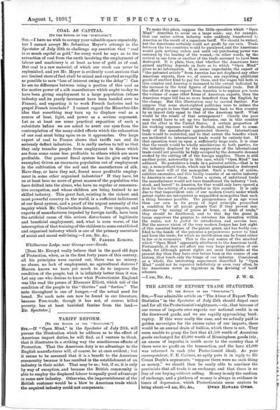TARIFF REFORM.
[To THE EDITOR OF THE " SPECTATOR:1 SIR,—If "Open Mind," in the Spectator of July 25th, will pursue the illustration which he adduces as to the effect of American import duties, he will find, as I venture to think, that it illustrates in a striking way the mischievous effects of Protection. That the American duty is no advantage to the English manufacturer will, of course, be at once evident; but it seems to be assumed that it is a benefit to the American community because it has resulted in the establishment of an industry in their midst. That may be so; but, if so, it is only by way of exception, and because the British community is able to employ the displaced labour to equally good advantage lit-some new industry. Otherwise, the impoverishment of the British customer would be a blow to American trade which the acquired industry could not compensate.. To make this plain, suppose the little operation which "Open Mind" describes to occur on a large scale; say, for example, that our entire cotton industry were suddenly transferred to America as the result of a rapacious tariff. We should be ruined, but the Americans certainly could not profit by our ruin. Trade between the two countries would be paralysed, and the Americans would gain nothing unless and until our purchasing power was restored by the healing of the wound,—in other words, by the revival in one form or another of the trade assumed to have been destroyed. It is plain, then, that whether the Americans have gained anything depends on facts as to which "Open Mind" gives us no information. If, as seems improbable, the export of "the patented article" from America has not displaced any ether American exports, then we, of course, are exporting additicaial goods of another kind to pay for them, and the wages bill both in this country and America is increased to the extent indicated by the increase in the total figures of international trade. But if the effect of the new export from America is to replace prd taut." the volume of some °thee forms of American exports, then the American wages bill has no more benefited than the English by the change. But this illustration may be carried further. For suppose that some short-sighted politician were to induce the British people to lure that erring patentee back to this country by an import duty equal to that of the American tariff. What would be the result of that arrangement? Clearly the poor man would have to set up two factories, one in this country and the other in the United States. A certain proportion of his working expenses would be doubled, and the cost to some- body of the manufacture aggravated thereby. International trade would be restricted, and to that extent the benefits which are incidental to international trade would be entirely lost. If that operation went on upon a sufficiently large scale, it is clear that the result would be wholly mischievous to both parties, for the industry displaced by the suppression of the international trade could not possibly be fully occupied by the domestic demand evoked by the cutting off of the foreign supplies. There is still another point, noteworthy in this case, which "Open Mind" has adduced. He postulates a trade in a patented article,—that is to say, a monopolised trade, which can be transplanted or destroyed at the mere will of the monopolist. Such a trade, of courde, exhibits anomalies, and this bodily transfer of an entire industry to America is one of them. Under a system of unfettered trade the manufacturer would not have transferred the industry "lock, stock, and barrel" to America, for that would only have opened door for the activity of a competitor in this country. It is only due to that improvident rule of our modern Courts under which patent rights are interpreted as unqualified monopolies that such a thing becomes possible. The jurisprudence of an age wiser than our own in its grasp of legal principle prescribed a condition for all patent grants that if they proved mis- chievous "by raising of prices at home, or limit of trade:' they should be disallowed, and to this day the grant in terms empowers the grantee to introduce his invention within the realm, not to forbid its introduction and ercercise here. But the narrow vision of the very modern Judges has lost sight of this essential feature of the patent grant, and has feebly con- fided to the hands of the patentee a preposterous power to bind and loose the trade, for which no justification can be found either in law or in economics. This is the real source of the mischief which "Open Mind" apparently attributes to the American tariff. Fortunately, it does not affect any very large proportion of our trade, for although patent rights are more formidable at the present day than they have ever before been in the course of our history, they touch only the fringe of our industry. Considered as a whole, the interesting experiment described by "Open Mind" could not be repeated indefinitely or even very often, be the Americans never so ingenious in the devising of -tariff
schemes. .






































 Previous page
Previous page